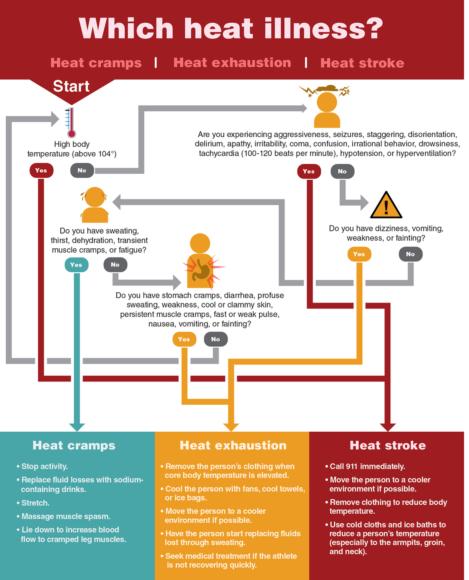Dehydration and Hypohydration
This is an excerpt from Nutrition for Sport, Exercise, and Health by Marie Spano,Laura Kruskall & D. Travis Thomas.
Whereas dehydration refers to the process of losing body water, hypohydration is the uncompensated loss of body water. Depending on the amount of body fluid lost, hypohydration can be mild, moderate, or severe. Symptoms of mild to moderate hypohydration include thirst, dry mouth, low urine production, dry and cool skin, headache, muscle cramps, and dark urine (not to be confused with bright yellow or orange urine from B vitamins, carotene, or certain medications). Signs and symptoms of severe hypohydration include
- increased core body temperature,
- decreased blood pressure (hypotension),
- decreased sweat rate,
- rapid breathing,
- fast heartbeat,
- dizziness or lightheadedness,
- irritability,
- confusion,
- lack of urination,
- sunken eyes,
- shock,
- unconsciousness,
- delirium,
- dry, wrinkled skin that doesn't "bounce back" quickly when pitched,
- reduced stroke volume and cardiac output,
- reduced blood flow to muscles,
- exacerbated symptomatic exertional rhabdomyolysis (serious muscle injury), and
- increased risk of heat stroke and death.
Nutrition Tip
Your hydration level might affect your ability to study and do well on tests. A body water loss of just 1 to 2 percent (1.5 - 3 lbs. for a 150-lb. person) can impair concentration and short-term memory, while increasing reaction time, moodiness, and anxiety.
During exercise, hypohydration occurs when fluid intake doesn't match water lost through sweat. Risk for hypohydration is greater in hot, humid environments and at altitude. Clothing, equipment, heat acclimatization, exercise intensity, exercise duration, body size, and individual variations in sweat rates all affect risk of hypohydration. With repeated exposures to hot environments, the body adapts to heat stress, and cardiac output and stroke volume returns to normal, sodium loss is conserved, and the risk for heat-related illness is reduced.
Sickle cell trait, cystic fibrosis, diabetes medications, diuretics, and laxatives increase risk of dehydration. Children and the elderly also have an increased risk of dehydration.
Will Supplements Make Me Dehydrated?
Reflection Time
Certain ingredients commonly found in detox products, cleanses, and weight-loss supplements will increase water lost through urine. Some of these products include uva ursi, dandelion (Taraxacum officinale), burdock root, horsetail, and hawthorn. Though many people believe creatine increases dehydration, no research supports this.
Several studies suggest children are at greater risk than adults for dehydration and heat illness. Children have more body surface area relative to their body weight, leading to greater heat gain from the environment. They have a lower sweat rate, and thus a decreased ability to dissipate heat through sweat (though this conserves body water) and higher skin temperature. Children also take longer to acclimatize to heat. Some studies suggest that children rehydrate as well as, if not better than, adults, whereas other studies show children, like adults, do not drink enough to adequately replace fluid losses in warm temperatures, even when they have sufficient access to fluids. However, sweat sodium concentration is lower in children than in adults, a factor that may help children retain fluid. Signs and symptoms of heat illness are presented in figure 8.4.

Figure 8.4 Heat illness.
Based on Binkley 2002.
Older adults do not have a sensitive thirst mechanism, so they generally drink less fluid than younger adults. In addition, the kidneys do not conserve water as well with age. Older individuals on certain medications might have increased fluid requirements or increased fluid losses. Some elderly people have limited access to food and fluids because of impaired motor skills, injuries, diseases, or surgeries that limit mobility. All these factors put the elderly at greater risk for heat stress, dehydration, and hypohydration.
Learn more about Nutrition for Sport, Exercise, and Health.
More Excerpts From Nutrition for Sport, Exercise, and HealthSHOP

Get the latest insights with regular newsletters, plus periodic product information and special insider offers.
JOIN NOW
Latest Posts
- Using double inclinometers to assess cervical flexion
- Trunk flexion manual muscle testing
- Using a goniometer to assess shoulder horizontal adduction
- Assessing shoulder flexion with manual muscle testing
- Sample mental health lesson plan of a skills-based approach
- Sample assessment worksheet for the skill of accessing valid and reliable resources


